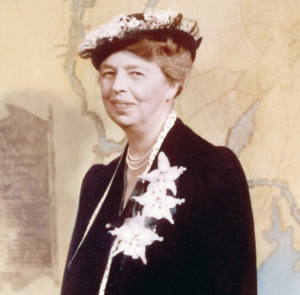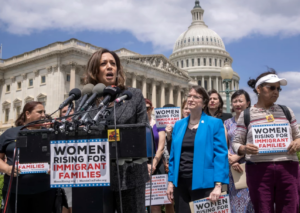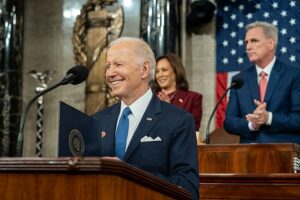“Crude Democracy” Book Review
In his book, “Crude Democracy” Thad Dunning, a professor of Political Science at UC Berkeley, has an answer to this question. The book argues that oil and natural resource wealth can promote both authoritarianism and democracy, and these outcomes rely on different mechanisms. Understanding these mechanisms is important to demonstrate the authoritarian or democratic effects of resource wealth. Do oil and other kinds of natural resources always cripple an economy, or can they be a blessing for democracy too?

A woman walks past a gas pipeline near the city of Asaluyeh, Iran, Jan. 22, 2014. | Photo courtesy Xinhua News
I remember once during a debate in history class when I was in school in Iran, the teacher mentioned, “Having oil has been a curse to our country! Oil is the reason why Iran has no industry, no innovation, and no development! Knowing that oil is going to compensate for everything, our people are not hardworking but are highly corrupted!” She left us with the question: Is oil bad for development and democracy?
In his book, “Crude Democracy” Thad Dunning, a professor of Political Science at UC Berkeley, has an answer to this question. The book argues that oil and natural resource wealth can promote both authoritarianism and democracy, and these outcomes rely on different mechanisms. Understanding these mechanisms is important to demonstrate the authoritarian or democratic effects of resource wealth. Do oil and other kinds of natural resources always cripple an economy, or can they be a blessing for democracy too?
To approach the answer, Dunning believes we should first challenge the so-called conventional wisdom of the “resource curse” theory, which supports the idea that natural resource wealth promotes autocracies. This theory finds that in most oil-rich countries, for example, revenues gained from oil have been spent on only a limited group of elites and not on the majority of the population or their needs. Thus, in these countries, we witness more dictatorships than democratic forms of governance. However, Dunning tries to refine this argument and points out that natural wealth, within a different structure, can also lead to democracy. In support of his theory and arguments, Dunning develops game-theoretic tools, and statistical modeling and brings various country case studies and fieldwork examples of Latin American countries and Africa. The book examines a theory that explains political deviation among resource-rich countries within many regions, as well as explores the emergence and endurance of democratic regimes.
The central argument of “Crude Democracy” is that resource wealth can both support and undermine democracy. The book demonstrates how rents in a resource-rich country can manipulate the elite’s assessment of the benefits and costs of a potential coup. The author claims that rents create direct pressure to support the coup, as the increased wealth of a government makes it a vulnerable target, and its mass population will not commit to future tax rises on the elites. On the other hand, such rents can generate indirect pressure against coups, since the increased wealth of the state facilitates the distribution of benefits to the masses without raising taxes on elites.
Dunning theorizes that a state is more likely to reap the democratic benefits of its natural resources when it is less economically dependent on the resource, or if there is high inequality in the non-resource economy, as resource rents can reduce the costs of the redistribution for the elites. With a detailed and thorough examination of the Venezuelan case and briefer examples of other Latin American countries and Botswana, Dunning develops his theory with quantitative analysis to look into the impact of oil on the state of democracy. He finds that inequality predicts democracy within Latin America and globally. He selects his case study, Latin America as “the most unequal region in the world” based on various analysts who divide the Persian Gulf as being the most equal region, all with oil resource wealth and similar state structures, and Sub-Saharan Africa in the middle. Dunning claims “Given high non-resource inequality and low resource dependence in the region, the theory suggests that if we are to observe the democratic effect of resource rents anywhere, we should observe it in Latin America.”
For instance, Dunning’s theory claims that domestic conflict over redistribution should increase as rents decline, and should decrease as rents increase. In the latter chapters of the book, Dunning devotes studies and analysis to cases where his theory predicts a democratic outcome. In the case of Venezuela, he argues that rents reduced the elites’ incentives to oppose democracy, not because they directly benefitted from the oil, but because the oil rents compensated the cost of distribution of wealth, as the drop in oil prices in the 1980’s put the democratic government under rising pressure.
The significance of his work is how Dunning’s case studies are not restricted to only oil resource-dependent economies and expand it to various mineral-based economies, such as the Botswana case, where the key resource is diamond. He claims that the elites used the income from diamonds to support social programs and promote democratic values, as for decades they have had hands in cattle ranching interest, the main alternative industry in Botswana. Based on the book’s theory the diamond income paid the cost of distribution of wealth itself.
“Crude Democracy” concludes that there are crude democracies just as there are crude autocracies and that the differences among them are systematic rather than random. Therefore, based on the theory presented in his book, we should be able to make predictions about the kind of political systems most likely to emerge in particular areas. Democracy appears, endures, and vanishes based on the elites’ assessment of costs, wealth, and incomes.
Ultimately, “Crude Democracy” is an important study into the political effects of natural resources in the resource-rich literature as it counter rigid and absolute ideas of the resource curse. With various detailed examples, it gives the reader a new insight that oil can also be a blessing to a country if it already has democratic institutions, and it is not always a curse.
If I were once again in school, the answer to my teacher would be: oil itself is not a curse for Iran! The historical authoritarian structure of Iran’s institutions is a curse. Dependent on oil for state revenues and not its citizens, Iran did not need to develop its tax administrations and economic infrastructures. With oil wealth and financially independent from its citizens, Iran became an autonomous state with growing authoritarian economic structures. Therefore, the question that remains now is: how can resource-rich countries overcome struggles to maintain democracy and how can these countries avoid undemocratic coups in the future?
Dena Motevalian is a Master’s student in International Relations at New York University. She grew up in Iran, then moved to France after college and launched a cultural non-profit for Farsi and Dari-speaking populations. She worked with Iranian and Afghan refugees in France, and on mass production in China, where she conducted research on goals for sustainability in the developing world. Her areas of interest are economic development, policy analysis, religious minorities, and women’s rights in the Middle East.







